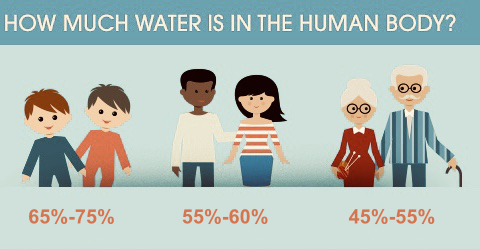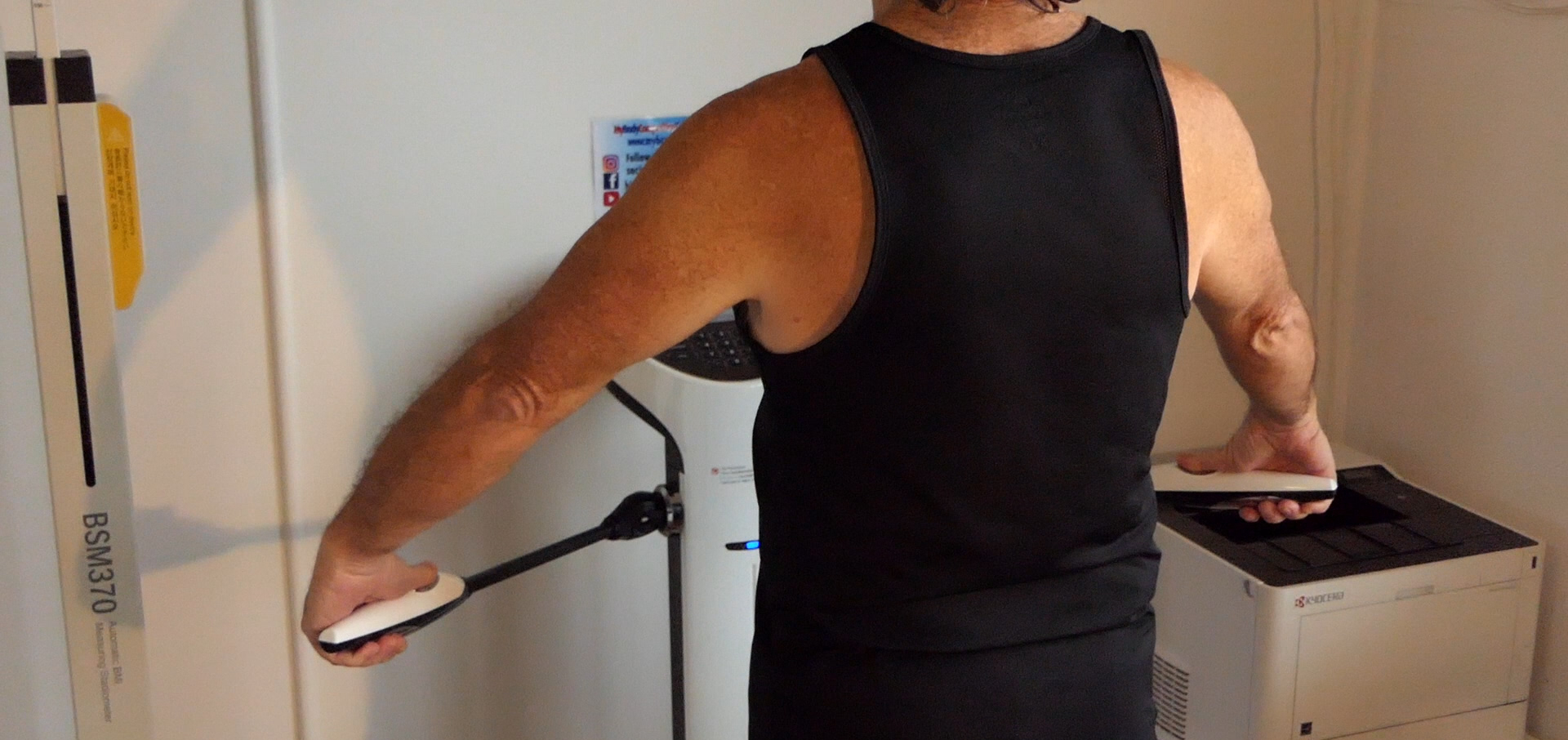What is Body Water?
Body water is the amount of water content found in your body. Up to 60% of the human body contains water.
Almost every cell in your body contains water: body water makes up 79% of your muscles, 73% of your brain, and even 31% of your bones. Overall your body weight can be 45-65% water.

What should your body water percentage be?
The amount of water within a person is influenced by your age, sex, and fitness level.
When we are born, we are almost 80% water. By the time we reach our first birthday that number drops to about 65%.
A major influence on our body is the amount of fatty tissue and lean body mass that we carry. Lean body mass carries much more body water than body fat.
An adult man will be about 60% water compared to an adult woman that will be about 55% water. If you are physically active, that number will increase depending on your lean body mass.
You might be wondering what is your ideal body water percentage. A better gauge of healthy body water levels is your ratio of extracellular water to your total body water. To understand what that means, we must first define your extracellular water and intracellular water.
What is extracellular water and intracellular water
Like discussed above, your body water can be found inside not only in your blood, but in your muscle tissue, your body fat, your organs, and inside every cell in your body. To account for all this, your total body water (TBW) can be divided into two basic groups.
Extracellular Water (ECW)
Extracellular water is the water located outside your cells. The water in your blood falls into this category. Roughly 1/3 of your fluid is attributed to ECW, and this water is found in your interstitial fluid, transcellular fluid, and blood plasma.
Extracellular water is important because it helps control the movement of electrolytes, allows oxygen delivery to the cells, and clears waste from metabolic processes.
Intracellular Water (ICW)
Intracellular water is the water located inside your cells. It comprises 70% of the cytosol, which is a mix of water and other dissolved elements. In healthy people, it makes up the other 2/3 of the water inside your body.
The intracellular water is the location of important cellular processes, and although it has many functions, a very important one is that it allows molecules to be transported to the different organelles inside the cell. Essentially, the Intracellular water picks up where the Extracellular water left off by continuing the pathway for fuel to be transported to the cells.
What is a healthy water balance?
When it comes to your body water and you, the most important thing to strive for is balance. Your Intracellular fluid: Extracellular fluid must remain at the same levels with respect to each other.
A healthy fluid distribution has been estimated at a 3:2 ratio of ICW:ECW. If your body water falls out of balance, this can signal changes in your health and body composition. Whether these changes are positive or negative depend on which type of water becomes unbalanced.
What does increased intracellular water (ICW) mean?
Having slightly more ICW than normal isn’t necessarily a bad thing. In fact, it can signal positive changes in your body composition.
Increased muscle mass is due to the enlargement of the number and size of muscle cells. When the muscle cells become enlarged, they are able to take in (and require) more ICW in order to power their cellular functions. Research has shown that resistance exercise can lead to increased intracellular water in humans. Increased ICW as a result of exercise is a sign of increased Lean Body Mass, which is a very good thing and has positive health benefits, including:
· Increased Energy Use
· Increased Strength
· Increased Immune System
What does excess extracellular water mean (ECW)?
If your ECW increases in relation to your ICW, this is something you should take special note of. Unlike ICW, you do not want to see your ECW increasing beyond normal levels. Excess ECW can indicate health risks, including:
· Inflammation
· Renal Disease (Kidney Failure)
· Unhealthy Fat Mass Levels (Obesity)
How to find your total body water?
Since it’s so important to keep an eye on your fluid balance, you’ll need to know how you can determine yours. There are two major methods to measure and determine your fluid levels. These are the dilution method and the BIA method.
The dilution method involves drinking a known dose of heavy water (deuterium oxide) and allowing it to distribute around the body.
This test takes several hours to complete during which any fluid of any type going in or out of the body has to be carefully recorded. For these reasons, you’re unlikely to have this test performed. The second, more accessible method to determine body water content is bioelectrical impedance analysis (BIA). More commonly known as a body scan, for most people this method is a much more practical method.

A small electrical current is applied to the body, and the opposition that current experiences (impedance), is measured. From that impedance result, a BIA device can report your total body water (fig 1). Advanced BIA devices are able to reflect the difference in Intracellular and Extracellular water as well, which can reveal the ICW: ECW balance. (Fig 2)


Bringing Yourself Back Into Balance
Maintaining a balanced ratio of approximately 3:2 is ideal for optimal health. If you find that this ratio is beginning to fall out of balance, there are some things you can do. Fortunately, these tips aren’t anything you already haven’t heard before: maintaining a healthy diet, staying hydrated by drinking enough water, and exercising regularly.
Avoiding excess ECW is ideal. From a dietary standpoint, one simple change that can work to reduce excess ECW is reducing the amount of sodium (salt) in your diet. Sodium is located primarily in your ECW, and when excess sodium is introduced into the body, the body’s natural response is to draw water out of your cells at the expense of your ICW. Reducing your sodium intake has a number of positive health benefits, so this tip can be considered simply a best practice for optimal health in addition to being a tactic for reducing high ECW.
On the flip side, increasing your ICW can be achieved by increasing your Lean Body Mass/increasing muscle mass through exercising. As the muscle cells increase in size, they will require more water to maintain their function. Exercise has the additional benefit of combating obesity, and as fat mass is reduced, ECW increases due to obesity will decline over time.
As you can see, body water can be an important indicator of your overall health. Without a healthy ICW:ECW ratio your body will begin to have problems.
The best thing you can do for proper body water balance is to maintain a healthy lifestyle. If you can achieve a healthy lifestyle, your body water will fall into balance naturally. The first step would be to find out where your body water levels are today, so you can start planning for a healthier life now.
Contact My Body Composition Solutions for an analysis of your composition and more information.
Disclaimer: This article should not substitute professional medical advice. When starting a new diet or exercise plan, always consult your physician and exercise professional first.
Information in this article has been extracted and edited from InBody USA ‘Body Water: Percentages and Ratios You Should Know.’
This post was updated on September 19, 2019, for accuracy and comprehensiveness. It was originally published on August 13, 2015.
This article includes words and phrases that link to several other information resources.
